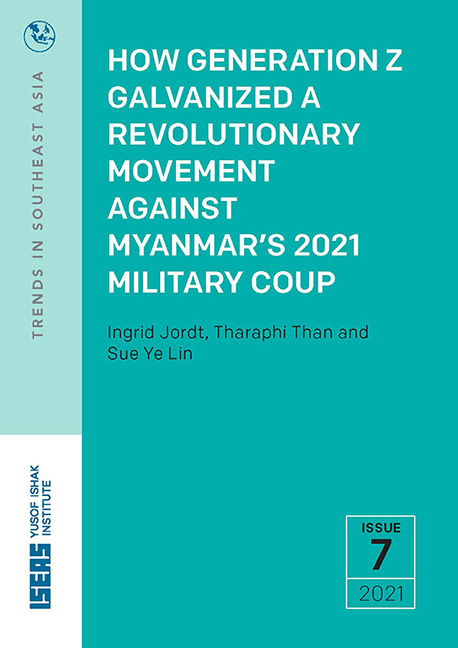How Generation Z Galvanized a Revolutionary Movement against Myanmar’s 2021 Military Coup
Published online by Cambridge University Press: 08 October 2021
Summary
INTRODUCTION
On 1 February 2021, the opening day of the new Parliament elected in November 2020, Sr. Gen. Min Aung Hlaing, commander-in-chief of the Myanmar Armed Forces, or Tatmadaw, launched a coup overthrowing the country's democratic government. The military declared a newly formed “State Administration Council” as the interim governing body, reserving to the Tatmadaw Commander-in-Chief the “exercise of legislative power by himself or by a body including him”. The arrest of President Win Myint and State Counsellor Aung San Suu Kyi, alongside other National League for Democracy (NLD) party members, writers, student leaders, activists, and monks, prompted a committee of fifteen ousted elected lawmakers to form a government-in-waiting under the name of the Committee Representing the Pyidaungsu Hluttaw (CRPH) and calling for Myanmar citizens and the international community to help restore democracy.
A leaderless youth movement identified in Myanmar as “Gen Z” has since been shaping the anti-coup movement by amplifying a wide array of civil society and minority voices. Their youthful exuberance and refusal to accept military rule has encouraged resistance from all sectors of society and has united the Bamar majority and ethnic minorities in a common anti-regime movement. Gen Z's protests have accomplished what has been elusive to prior generations of anti-regime movements and uprisings. They have severed the Bamar Buddhist nationalist narrative that has gripped state-society relations and facilitated the military's ideological control over the political landscape. Gen Z has challenged attitudes and values that have restricted participation in national politics to a patriarchal, gerontocratic, and Bamar Buddhist majority. Emphasizing values that draw from global democratic ideals and imaginaries as well as universal Buddhist ethics, Gen Z has guided a movement of movements that is leaderless, emphasizes horizontal relations (rather than hierarchical ones), and accentuates a social justice orientation inclusive of all members of society.
This paper charts descriptively and analytically the first two months of Myanmar's 2021 anti-coup protests. Revolutionary movements are messy, processual, and dialectical; we aim to capture a moment in an evolving situation, infusing our inquiry with historical context and genealogical reasoning so as to draw out certain features of particular political and cultural salience.
- Type
- Chapter
- Information
- How Generation Z Galvanized a Revolutionary Movement against Myanmar's 2021 Military Coup , pp. 1 - 33Publisher: ISEAS–Yusof Ishak InstitutePrint publication year: 2021



